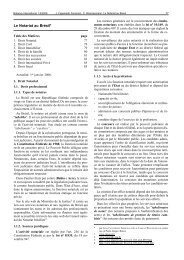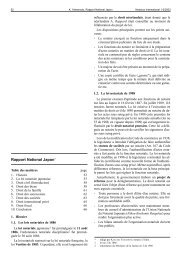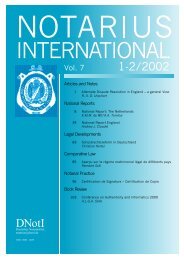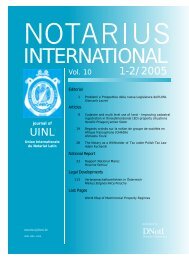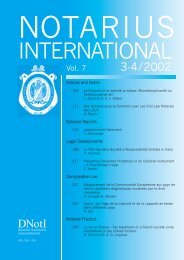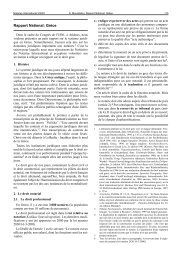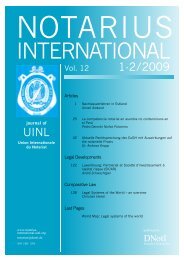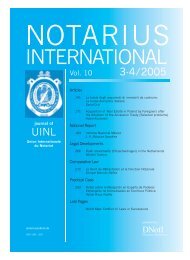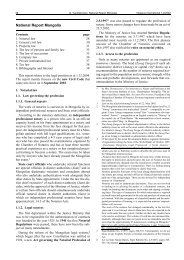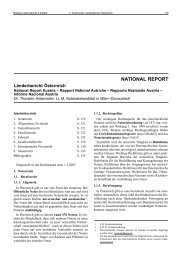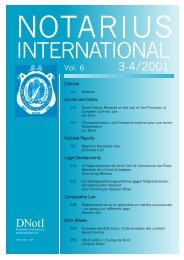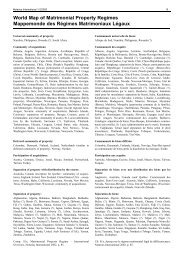National Report Mexico - Notarius International
National Report Mexico - Notarius International
National Report Mexico - Notarius International
Create successful ePaper yourself
Turn your PDF publications into a flip-book with our unique Google optimized e-Paper software.
<strong>Notarius</strong> <strong>International</strong> 3-4/2005 J. A. Márquez González, <strong>National</strong> <strong>Report</strong> <strong>Mexico</strong> 207<br />
tual conviction – deriving from a different approach to life<br />
– or for reasons imposed by present-day social and financial<br />
realities. In the light of this, the legislator has been<br />
obliged to deal with the problem in one way or another.<br />
Most of the civil legal systems in the Republic do not<br />
legally acknowledge the possibility of cohabitation.<br />
However, although they do not specifically acknowledge<br />
the concept, these legal systems nevertheless allow the<br />
legal regulation of certain of their consequences.<br />
Nevertheless, many reforms on this aspect have been<br />
incorporated into the CCFD and there is even a special<br />
chapter on the concept (chapter XI, Cohabitation, articles<br />
291 bis to 291 quintus). This code contemplates rights of<br />
succession (article 1368, V), maintenance (article 291<br />
quáter), cases of domestic violence (323 quintus), impediments<br />
due to kinship by marriage (294), the possibility<br />
of adoption (391), creation of family property (article<br />
724) and even presumptions of law on filiation (383).<br />
In the rest of the Republic, the civil codes of the states<br />
of Baja California Sur, Guerrero and the Federal Code of<br />
Hidalgo state that cohabitation is the source of the obligation<br />
to provide alimony and the civil codes of Tabasco,<br />
Tlaxcala and the Federal Code of Zacatecas establish<br />
equality between spouses and cohabitants with regard to<br />
this obligation.<br />
Some federal states establish other requirements for<br />
this obligation to provide alimony to exist: the CCFD requires<br />
five years' cohabitation, that there must have been<br />
children and that neither of the cohabitants have married<br />
a third party. The obligation is invalid if there is more<br />
than one cohabitant (the civil codes of Chihuahua, Morelos,<br />
Sonora and Yucatán coincide on this point). Articles<br />
241 and 242 section II of the Federal Code of Zacatecas<br />
also require that the union should have lasted more than<br />
five years. Nevertheless, the Civil Code of Chiapas states<br />
that cohabitation must have taken place for only three<br />
years, that the beneficiary has an honest lifestyle and that<br />
both cohabitants have remained unmarried. It also specifies<br />
that if the male is disabled and has no assets for his<br />
subsistence, he may receive alimony from the female.<br />
The civil codes of Tamaulipas and Veracruz coincide in<br />
the requirement that the cohabitants should have lived together<br />
as a couple for only three years – or less if there<br />
are any children -, provided that they do not marry a third<br />
party. The Civil Code of Querétaro states that the obligation<br />
to provide alimony continues to exist throughout the<br />
duration of the cohabitation and may even be prolonged,<br />
when cohabitation has ended, for a period equal to its duration,<br />
provided that the person receiving alimony has no<br />
other partner and lives honestly.<br />
3.7.2. Homosexual couples<br />
The laws of <strong>Mexico</strong> do not recognise homosexual couples.<br />
3.8. Children<br />
Representation of children by their parents. In <strong>Mexico</strong>,<br />
children are subject to parental authority up to the<br />
age of 18. The parents, in fact, are the minor's legitimate<br />
representatives and possess the legal right to manage<br />
their assets and represent the children in court. However,<br />
they can only alienate or encumber immovable property<br />
and valuables in cases of absolute need or clear benefit<br />
and with the prior authorisation of the judge (articles 425-<br />
442). Such permission is processed in voluntary jurisdiction<br />
proceedings.<br />
To date, very few civil codes in the Republic contain<br />
specific titles or provisions relating to childhood or minority,<br />
although the following civil codes do contain such<br />
provisions: Guerrero (article 35), Jalisco (article 567 et<br />
seqq.), Quintana Roo (article 984 et seqq.), Tabasco (article<br />
404 et seqq.) and Tlaxcala (article 247 et seqq.).<br />
At the federal level there is a Ley para la Protección de<br />
los Derechos de Niñas, Niños y Adolescentes (Law for<br />
the Protection of the Rights of Girls, Boys and Adolescents)<br />
that was passed by President Zedillo in 1999. Zacatecas,<br />
the Federal District and Veracruz also have specific<br />
laws on these matters.<br />
3.9. Power to provide for one's own disability<br />
This concept does not yet exist in <strong>Mexico</strong>, although<br />
certain excellent case-law studies have been carried out<br />
on this matter.<br />
4. Law of succession<br />
4.1. General observations<br />
In our country there are two types of succession: testate<br />
and intestate. The first type derives from the making of a<br />
will (an act that the law describes as highly personal, revocable<br />
and free). The second type occurs precisely in the<br />
absence of a last will and testament. The act of making a<br />
will is individual and therefore joint or reciprocal wills<br />
are not permitted. There are two ways to inherit: universally,<br />
in the capacity of heir, and privately in the capacity<br />
of legatee.<br />
4.2. Legal succession<br />
In accordance with the provisions contained in article<br />
1599 of the CCFD, legal inheritance occurs precisely in<br />
the following circumstances:<br />
- When there is no will or the will that was made is void<br />
or has become invalid;<br />
- When the testator did not dispose of all his assets;<br />
- When the condition imposed on the heir is not fulfilled;<br />
and<br />
- When the heir dies before the testator, repudiates the<br />
inheritance or lacks capacity to inherit, if no substitute<br />
has been appointed.<br />
The moment when the estate is shared must go back to<br />
the decease of the author of the will. For that reason, the<br />
concept known in other legal systems as trust estate does<br />
not exist in our legal system. In fact, article 1649 of the<br />
CCFD provides as follows: “Succession occurs at the<br />
moment of decease of the principal of the estate...”, while<br />
article 1660 provides as follows: “The effects of acceptance<br />
or repudiation of the estate are always backdated to<br />
the date of the decease of the person from whom the estate<br />
is inherited”. These provisions are repeated in article<br />
1290 relating to the case of legatees.



